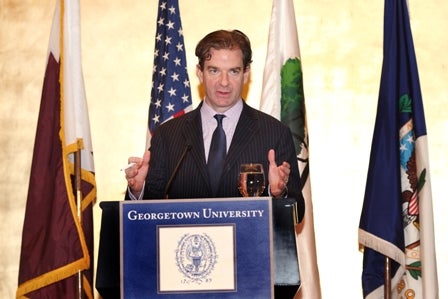American Studies, Dialogue Series, Regional Studies
Peter Bergen Lectures on the Remaking of the Middle East

On February 13, 2012, Peter Bergen delivered the 2011-2012 CIRS Faculty Distinguished Lecture titled, “The Awakening: How Revolutionaries, Barack Obama, and Ordinary Muslims are Remaking the Middle East.” In addition to being CNN’s security analyst, Bergen is a Schwartz Fellow at the New American Foundation and an adjunct lecturer in public policy at the Kennedy School of Government at Harvard University. Bergen was introduced to the audience by Will Cha, Student Government President at the Georgetown University School of Foreign Service in Qatar.
Bergen discussed five different, but interrelated topics, which he listed as “Al Qaeda, terrorism, Afghanistan/Pakistan, the Arab Spring, and the influence of President Obama on some of these issues.” On the topics of Al Qaeda and terrorism, Bergen explained how he was one of the few Westerners to have met the world’s most-wanted man, Osama bin Laden, face to face in 1997 in Eastern Afghanistan. During that interview, Bin Laden declared war on the United States because of its support for Israel, sanctions against Iraq, as well as other foreign policy critiques. Bin Laden described the United States as weak and scarred from all of its past failed wars and pullouts from Vietnam, Beirut, and Mogadishu. This analysis of a weak United States, Bergen said, was an important insight into why 9/11 happened because it showed that Bin Laden thought that he could pressure the United States into similarly pulling out of the Middle East. It turned out, however, that “9/11 was a major strategic error for Al Qaeda because, first of all Al Qaeda – which of course means ‘the base in Arabic’ – lost their base in Afghanistan,” he said. So, instead of the United States being pressurized to exit the Middle East, the reverse happened, and now, as a result, the United States has increased its presence on the ground in several different countries of the Arab world. Bergen continued by saying that “the 9/11 attacks were a strategic failure not only because they didn’t achieve the goal that Bin Laden wanted, but also because they led eventually to the defeat of Al Qaeda, and, in fact, to the death recently of Bin Laden himself.”
“Al Qaeda was losing the war of ideas in the Muslim world,” Bergen argued, not because the United States and the West were winning, but because Al Qaeda was losing any support it ever had through its detrimental demands and actions. “Al Qaeda and groups like it position themselves as the defenders of true Islam, but Muslims began to notice that many of Al Qaeda’s victims were, in fact, Muslims,” in Iraq, Indonesia, Jordan, and elsewhere in the world. This turned past supporters and sympathizers into outspoken opponents and enemies of Al Qaeda. Because “Bin Laden never proposed a positive vision of the Middle East,” in terms of economic, infrastructural, or developmental policies, he had nothing to offer Muslims but destruction, which is not an impressive prospect of future governance, Bergen explained. “The idea of an Al Qaeda hospital or an Al Qaeda school is an oxymoron,” he said.
The Arab Spring was an interesting backdrop for understanding exactly how weak and out of touch Al Qaeda was with Arab societies across the Muslim world, Bergen argued. The fall of Arab regimes signaled some of the most significant events in the region in decades, and, yet, Bin Laden was silent on these issues, despite his penchant for commenting on important world events over the years. Thousands of people marched through cities in Egypt, Tunis, and Libya, and yet none voiced any affiliations with Al Qaeda’s anti-Western ideologies. “Bin Laden’s foot soldiers and his ideas were notably absent in the events of the Arab Spring.”
Describing what he thought the future governance of the Middle East will look like, Bergen said that “the monarchies in the Middle East, for a variety of reasons, are going to be able to weather the Arab Spring fairly well.” This is because monarchies have the benefit of being able to transform themselves from absolute to constitutional, unlike dictatorships, which are by definition absolute.
Elsewhere in the surrounding region, although there is a rapidly increasing population and only 2% economic growth in Pakistan, there are still some emerging positives such as a strong independent media, judiciary, and civil society groups. Similarly, in Afghanistan, there have been some positive developments, especially in terms of schooling, a decrease in infant mortality, an increase in GDP, better infrastructure, and a general consensus on the ground that the country is heading in the right direction. A future problem that will surface, however, will be the withdrawal of United States financial support and the subsequent economic crisis, Bergen warned.
In conclusion, Bergen noted that President Obama’s popularity in the Middle East has been in a steady state of decline, stemming from, among other things, “the Obama Administration’s lack of real effort on the Israeli/Palestinian negotiations.” Many people thought of Obama as the “anti-war president,” but he surprised everyone by actually being very tough on national security and has engaged the United States in a variety of covert and actual wars all over the world.
For more than 15 years, Peter Bergen has traveled extensively throughout Afghanistan, Pakistan, Egypt, Saudi Arabia, and more recently Iraq, to report on national security and the Al Qaeda network. His work can be found in many prestigious publications including the New York Times, Washington Post, Vanity Fair, the Wall Street Journal, and the International Herald Tribune.
Article by Suzi Mirgani, CIRS Publications Coordinator